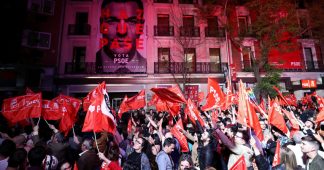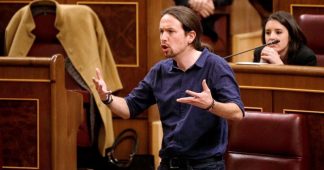The defeats for Barcelona mayor Ada Colau and Manuela Carmena in Madrid compound recent woes for Podemos. As popular movements decline, the Spanish left’s onetime promise has given way to the stabilization of the center.
By Jorge Tamames
29/52019
We should not underestimate the scale of this defeat. Five years after its triumphal breakthrough in the 2014 EU elections, Podemos has suffered a resounding defeat, losing almost all of the key municipalities it won with grassroots coalitions in 2015. The exceptions are Cádiz — whose anticapitalist mayor, Kichi, won an impressive absolute majority — and Valencia, still governed by a leftist coalition, but where Podemos has failed to secure a municipal foothold.
Podemos has suffered massive setbacks in every regional parliament and even failed to secure representation in two of them. As for the European elections, whereas PSOE won 32 percent of the vote, Unidas Podemos (UP), the Podemos-United Left (IU) coalition, collapsed to 10 percent (in 2014 the two parties, running separately, earned almost twice as much). Yet the setbacks also spread across the Left. On Sunday, once-inspiring mayors, such as Manuela Carmena in Madrid and Ada Colau in Barcelona, lost out to conservatives and Catalan nationalists, respectively. If much of the blame has to lay with the divisions on the Left, it is also important to reflect on the mistakes and wrong turns made.
More broadly, we can today characterize the current situation in Spain as governed by a stabilization of the center after years of popular revolt. Indeed, for all its threatening appearance, even the emergence of the radical right Vox has facilitated this process. Failing to make a breakthrough in this weekend’s election, it appears to have hardened as a small party that appeals only to wealthy Spaniards and members of the armed forces. It is enough to propel the conservative PP to regional and local power, but also serves PSOE prime minister Pedro Sánchez as a convenient boogeyman. As he forms a national-level government may now be tempted to draw the liberal Ciudadanos away from a right-wing coalition and toward a large, centrist alliance.
With the PSOE at full strength, Podemos at an all-time low, and facing four years without national elections on the horizon, the stage is set for a normalization of Spanish politics on terms acceptable for the status quo. “Spain has closed the most convulsive political cycle of its democratic history reinstituting the regime,” journalist Antonio Maestre writes. He draws the grim conclusion: “Power has returned to power.”
Sánchez’s Rise
It is easy to forget that, only a year ago, Pedro Sánchez looked like a rather hapless opposition leader. Things changed in June as a court ruling on corruption scandals destroyed PP premier Mariano Rajoy; a censure motion was then enough to bring Sánchez and the PSOE to power. But his weakness in parliament forced him to depend on UP and a host of regionalist or pro-independence Basque and Catalan parties.
Indeed, even a month ago, Sánchez still faced an uncertain future. To his right loomed the threat of a reactionary alliance formed by the PP, the self-described liberal Ciudadanos, and the radical right Vox. To his left, UP viewed him as stalled and dithering after a promising start. But it was the refusal of Catalan parties to support a progressive budget negotiated with UP that forced Sánchez’s call for early elections.
The run-up to the April elections felt ominous. Taking a leaf from François Mitterrand’s book, Sánchez boosted Vox leader Santiago Abascal by seeking — but ultimately failing to secure — his participation in a televised debate. Beyond that, he opted for a rather flat campaign, pitching PSOE as a paragon of moderation and garnering endorsements from the Economist and Financial Times. The stage seemed set for yet another upset, like Donald Trump’s or Jair Bolsonaro’s.
As it turned out, such polarization did not mobilize right-wing voters. Instead, it generated a state of emergency across the Left, which voted in record numbers — total turnout was close to 76 percent, the highest since 1996. The main beneficiary was PSOE, which obtained 29 percent of the vote and its first electoral victory since 2008. Following three years of vicious infighting, confused messaging, and strategic swerves, UP looked set to shrink to half of its 2016 size. Instead, it clung to 14 percent — losing 1.3 million votes and a third of its parliamentary seats but performing above expectations.
Paradoxically, the Right’s catastrophic results — with the PP plummeting to an all-time low of sixty-six seats, half of what it previously held — resulted from a majoritarian and rural-biased electoral system that traditionally benefited conservatives. Indeed, if we take April’s results and filter them through the proportional system employed in May’s contests, this would have delivered conservative victories in a large number of regions and cities were PSOE and Podemos currently govern.
Futile Divisions
In the run-up to Sunday’s election, all eyes turned toward Madrid, where both Right and Left had the best chance of pulling off an upset. Polls placed the distance between the two blocs within the margin of error, both at the municipal and regional level. Municipal power had swung to the Left in 2015, when Podemos-backed Manuela Carmena — a former communist judge, running as an independent — obtained an unprecedented victory. Bur regional government — a conservative stronghold for the past twenty-five years in spite of a slew of corruption scandals tarnishing successive regional presidents — seemed within reach of a left coalition led by the PSOE.
The challenge, then, was to retain the mayor’s office and eject the Right from the regional presidency. Within Podemos, the second task fell upon Íñigo Errejón, the party’s number two who was displaced after falling out with general secretary Pablo Iglesias. In January, Errejón announced he was joining forces with Carmena to create a separate electoral platform called Más Madrid. Polls showed Podemos was losing support, and Errejón was wary that his electoral team, largely hand-picked by the party apparatus, would not go along with the campaign strategy he envisioned. He perhaps expected Podemos to show flexibility and join his initiative, as the party often does when dealing with regional partners (confluencias). Instead — acting against the advice of its Madrid general secretary — Podemos opted to stand by itself.
The split seemed justifiable on both sides. December’s Andalusian elections, where the three right-wing parties joined forces to end thirty-six years of PSOE rule, suggested that political fragmentation can mobilize large electorates by appealing to different audiences. The goal for Más Madrid and Podemos was to obtain separately a larger share of the vote than they previously did when acting as one, i.e., 16 percent in April 2019, 18 percent in May 2015. Podemos could cling to radical rhetoric while Errejón wooed moderate voters with a softer discourse.
The results seem to validate this strategy — Errejón’s platform won almost 15 percent, while Podemos and IU scored slightly over 5 percent. Yet this was a Pyrrhic victory, as the Left still lacks the numbers to take regional power. To make matters worse, the victors in Madrid are particularly unimpressive PP candidates, who ran a gaffe-prone campaign and will now govern with support from the radical right (Vox’s municipal candidate is a recurring apologist for fascism; its regional leader is a Catholic fundamentalist who spent the campaign claiming public schools teach zoophilia and foot fetishism).
The situation was different in the Madrid municipal vote. Here, both factions initially supported Carmena’s reelection bid. Over the last four years, her municipal team has mounted an ambitious offensive against pollution, increased social spending, provided a platform for a number of intersectional mobilizations, and made important advances in transparency, while enforcing budgetary surpluses. At the same time, the mayor has frustrated her activist base on numerous counts. The main sources of contention involve her support for a colossal real estate project in northern Madrid — effectively a giveaway to construction companies and Spain’s second-largest bank — as well as her unwillingness to stand up to the previous finance minister’s imposition of austerity on Spanish cities, a stance that led her to fire her leading economic policymaker, Carlos Sánchez Mato, in late 2017. Sánchez Mato now headed a candidacy to Carmena’s left, which polls gave less than 2 percent — well below the 5 percent threshold necessary to acquire representation.
Three weeks before the elections, Podemos leaders abruptly switched gears and supported Sánchez Mato instead of Carmena. During the last two days of the campaign, they launched a barrage of criticism against centrist administrators in her municipal team. While the case for challenging their influence or supporting a candidacy to Carmena’s left was well founded, such last-minute decisions seemed fueled by personal animosity rather than strategic criteria. Myopic and suicidal maneuvers, after all, have long been a hallmark of Madrid’s left. As expected, the gambit was an exercise in futility: Mato drew 2.6 percent of the vote, not even enough to facilitate the Right’s victory.
Carmena’s defeat also has to do with the failure to mobilize her own base, as witnessed by voting patterns. While overall turnout was similar to that of 2015, it increased in wealthier districts to the north and northwest of the capital and dropped by as much as 3 percentage points in the working-class neighborhoods of the south and southeast — instrumental for the Left’s 2015 victory. This seemingly confirms that the municipal team has cultivated the affluent city center at the expense of outer districts, which lost some of their previous enthusiasm. “The greatest projects took place in the center, but the peripheral neighborhoods also wanted visible changes” remarks Analía Plaza, a journalist covering municipal politics at eldiario. “Besides, the center itself is becoming a huge shopping mall. And who gets to enjoy it? Tourists and consumers. I expected more from a government that came to change the city’s development model.”
The mayor team’s sluggishness in the face of gentrification was another source of frustration. “They seemed not to realize that Madrid is a laggard fighting this trend and that gentrification has already ravaged London, Berlin, and Barcelona. Instead of noticing and reacting, they took very long to regulate touristic housing and focused exclusively on the city center,” Plaza points out. Unsurprisingly, the mayor’s campaign, which centered on bland, feel-good messaging rather than the transformative project envisioned four years ago, did not rally a critical mass of supporters. With lower turnout figures than April, it seems clear that voters did not feel the same urgency to mobilize on a regional level either — despite the fact that these governments administer critical public goods, such as education and health care.
Relations between former Podemos allies are now at an all-time low. The campaign featured a litany of visceral and often personal recriminations, not unlike the endless litigation of the 2016 primaries in the Democratic Party. There is an important caveat, however: programmatically, the differences between pablistas and errejonistas are relatively small. Observers outside of Madrid could be forgiven for viewing their infighting as gratuitous.
Sánchez’s Options
With the electoral cycle over, Sánchez will now move toward consolidating a governing coalition. PSOE remains more than fifty seats short of a majority, but Iglesias finds himself in a weak position to demand the left coalition he has been pressing for during the past months. Such an alliance could introduce some friction in the otherwise smooth relationship between business and political elites. It is probably no coincidence that, while international investors reacted tepidly to the prospect of a PSOE-UP coalition, Spain’s largest bank issued an alarmist report, warning against left populism and advising Sánchez that a deal with Ciudadanos leader Albert Rivera “would please the market more than Podemos.”
Sánchez, however, is under no hurry to invite Podemos into the government — even less so after Sunday’s results. In previous televised debates, he refused to clarify, when pressured by Iglesias, whether he would seek Ciudadanos’s support. It fell upon Rivera to insist that his party would rather join forces with the radical right. But Rivera has broken his word before, and he has a proved talent for overnight ideological conversion. In four different regions, Ciudadanos’s support could prove instrumental for PSOE to hold power. One of them is Madrid, without which the PP would lose its last remaining stronghold.
A PSOE-Ciudadanos pact still faces considerable obstacles. Until now, Ciudadanos’s aim was to displace the PP as the leading right-wing party. It therefore insisted on presenting the Prime Minister as an unhinged extremist. Besides alienating PSOE voters, an alliance with Ciudadanos would demolish Sánchez’s position in the Basque Country and especially Catalonia, which witnessed the largest increases in turnout and remains essential to secure center-left victories.
Perhaps more importantly, PSOE recovered by moving leftward. Paradoxically, UP’s pressure on Sánchez has ultimately benefited his party, if only by forcing it to take its own rhetoric on social equality somewhat seriously. As elsewhere in Europe, the center-left survives only in those countries (such as Portugal or the UK) where it rejects the third way’s legacy. While Sunday’s results will push PSOE to dispense with Podemos. reaching a modus vivendi between social democracy and left populism has become the only way forward for progressives.
Whither Left Populism?
This dilemma cuts both ways and imposes some hard truths on UP. Fragmentation has put an end to Spain’s two-party system, but the political battlefield remains a competition between right and left, in which Podemos has assumed its role as PSOE’s auxiliary force. The party rejected this position since its inception, but the “populist moment” of 2014–2016 seems long gone. Politics can no longer be presented as a contest between “the people” and an oligarchic elite, the way Iglesias and Errejón once did. This strategy allowed Podemos to appeal to the overwhelming majority of Spaniards who backed the 15-M anti-austerity movement’s agenda of radical reform, not just traditional left-of-PSOE voters, who represent an electoral minority.
The party leadership’s loss of support in public opinion polls, coupled with the decrease in social mobilization following the 2011–2013 protest cycle — in part due to burnout, but also to Podemos’s success and its capacity to integrate activists into its own party structure — stand in the way of a surge like the one experienced in the period up till 2016. Through its large recent mobilizations, feminism has become a key terrain for emancipatory politics, but the party has yet to find a way to capitalize from it electorally. As Manuel Monereo — a longtime Iglesias advisor and a recurrent critic of Errejón — points out, Podemos has now placed itself in the role traditionally held by Izquierda Unida, the communist coalition that was perennially thrust into a marginal position by PSOE.
None of this should come as a surprise. Since 2016, Podemos has adopted a succession of strategic zig-zags: calling for full opposition to PSOE in early 2017, collaborating with the center-left from mid-2017 onwards, and demanding a referendum on Spain’s monarchy in late 2018 — an idea that was swiftly shelved following a disastrous public rollout. The constant trickle of high-profile resignations following the party’s second Vistalegre congress, including those of Podemos founders who did not subscribe to Errejón’s views, speaks to the current leadership’s isolation.
In the plan presented at the party’s 2017 congress, Iglesias lay out a clear set of goals he expected to achieve by 2020. These included retaining the progressive municipalities, acquiring regional power, and vastly increasing Podemos’s membership, while maintaining a combative relationship vis-à-vis the PSOE. Him and his team have failed to achieve every single one of these goals. In normal circumstances, UP would be due for self-criticism and a renewal of its leadership. But introspection will not take place, given the current juncture and the party’s penchant for blaming its woes on external culprits, such as media hostility, Errejón’s “treason” — which bears no relation with the party’s dismal results beyond Madrid — or the previous government’s dirty war against Podemos.
To an extent, these problems date back to the party’s founding. With a vertical structure, autocratic chain of command, and media-driven leadership, Podemos was designed to deliver swift electoral victories rather than a vibrant, plural organizational culture. Absent a climate of political exceptionality, it stagnates. “Podemos is not really a party,” journalist Enric Juliana writes. “It is a movement polarized by Iglesias’ strong personality.”
The problem is institutional as much as personal. Podemos and its breakaway factions are plebiscitary structures that, as César Rendueles and Jorge Sola highlight, have “weakened the organic links (between the party base, its cadres and public representatives), granted enormous power to the leaders — who maintained de facto control over the lists — and favored a functioning more based on imposition than deliberation.” Más Madrid must also find a way to move beyond the charismatic appeal of its leaders — a feature that is helpful during electoral campaigns, but has little use in the absence of electoral victory and, as Carmena’s case highlights, presents important limitations when the Left is in office.
In a 2000 essay that Iglesias is fond of quoting, Perry Anderson observed that “the only starting-point for a realistic Left today is a lucid registration of historical defeat.” The time has come for Podemos’s present and former leaders to take this lesson to heart.
Published at https://www.jacobinmag.com/2019/05/podemos-sanchez-psoe-elections-madrid-barcelona











